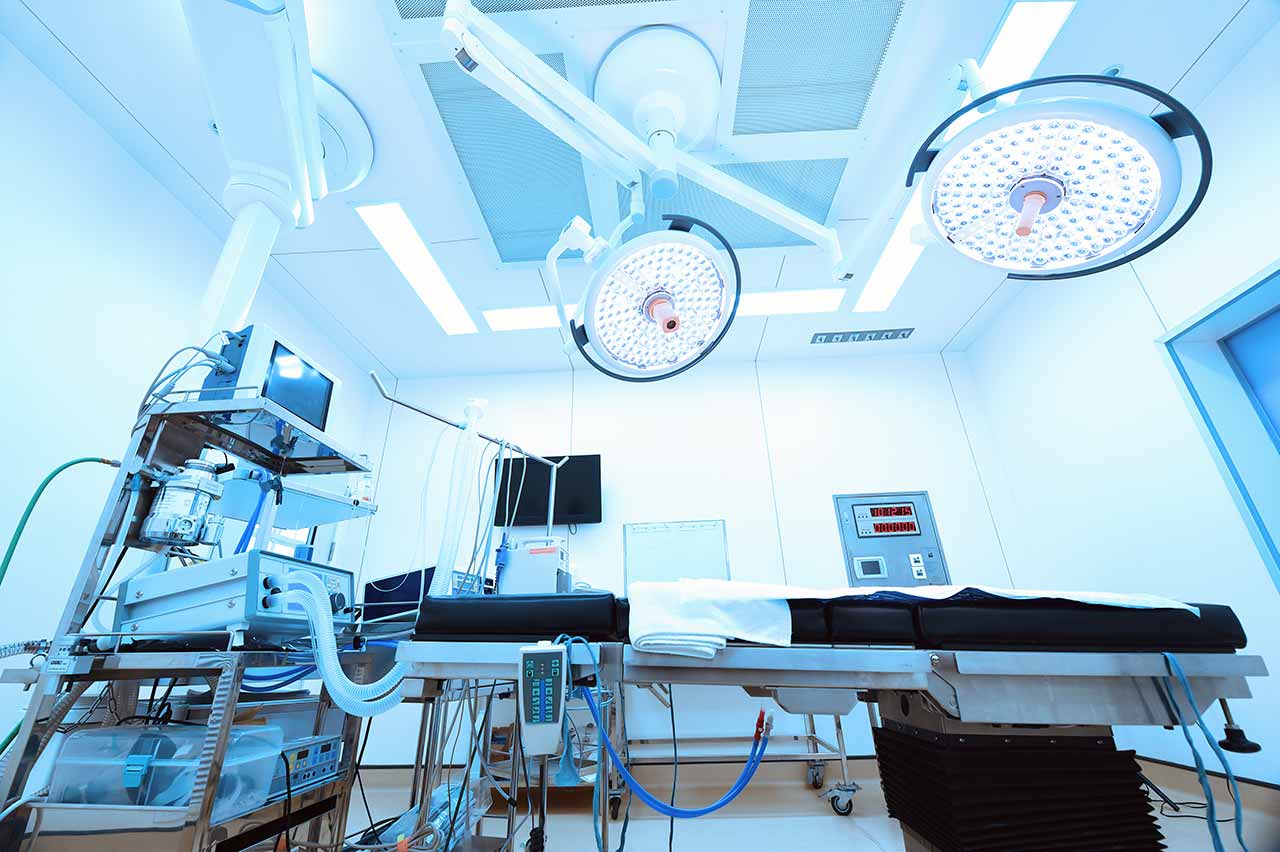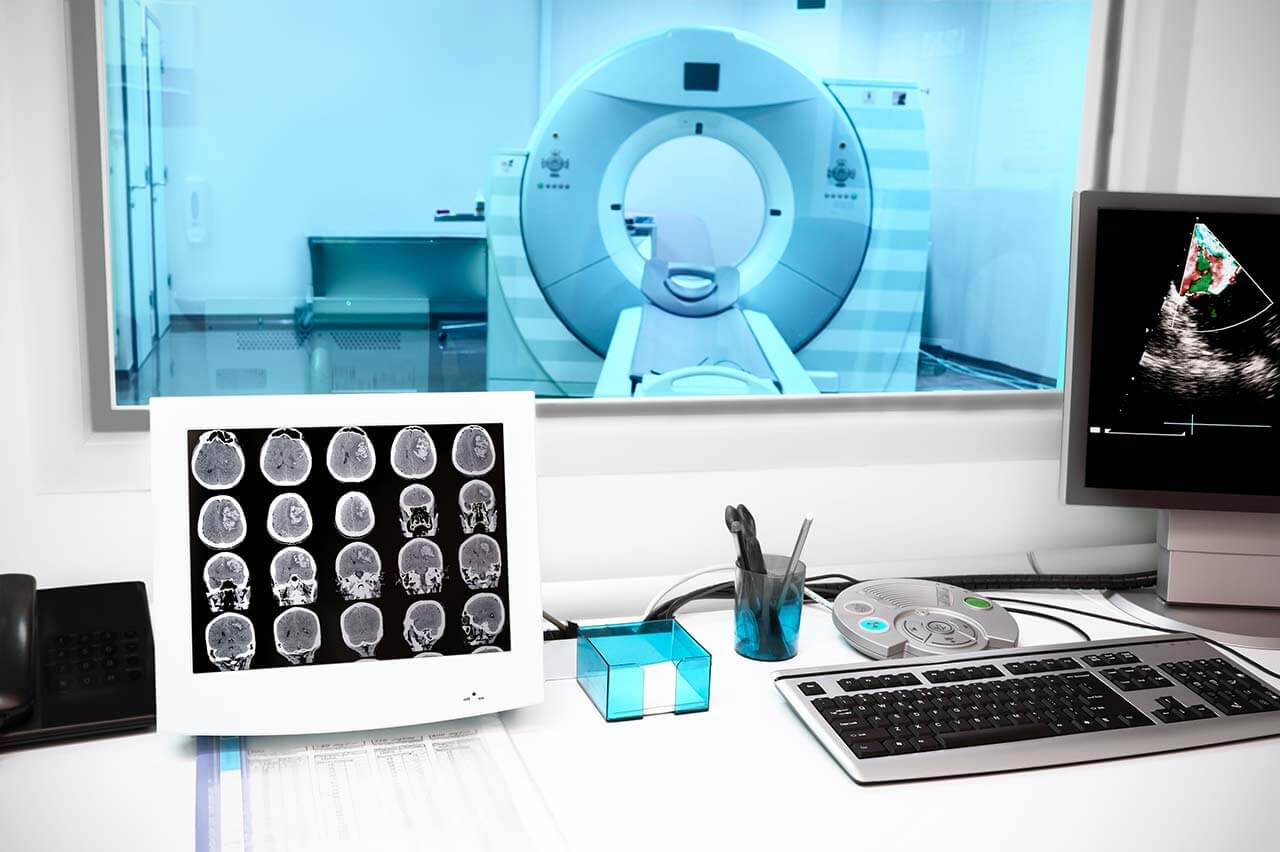
The program includes:
- Initial presentation in the clinic
- clinical history taking
- review of medical records
- physical examination
- laboratory tests:
- complete blood count
- inflammation indicators (CRP, ESR)
- abdominal ultrasound
- MRI of the abdominal cavity (on indication 1200 €)
- nursing services
- consultation of related specialists
- consultation of the chief physician and all leading experts
- development of dividual treatment plan
- written statement
Required documents
- Medical records
- Abdominal ultrasound (if available)
- MRI/CT scan of the abdomen and pelvis (if available)
Service
You may also book:
 BookingHealth Price from:
BookingHealth Price from:
About the department
The Department of General and Abdominal Surgery, Hernia Surgery, Endocrine Surgery, Colorectal Surgery and Bariatric Surgery at the Hospital zum Heiligen Geist Frankfurt am Main offers the full range of surgical treatment in the areas of its specialization using the very latest medical advances. The priority focuses of the work of the department's surgical team include operations for pathological soft tissue lesions, thyroid disorders and gastrointestinal diseases, including the gallbladder, rectum and anus, as well as interventions for inguinal and umbilical hernias. The medical facility also offers bariatric surgery for patients with type 2 diabetes mellitus. An indisputable advantage for patients is the fact that the department's surgeons have a perfect command of minimally invasive techniques, which today are the gold standard of surgery in developed European countries. In the operating rooms, hygiene and sterility standards are strictly observed, so patients can be sure of the safety of treatment. The doctors hold individual consultations, where they discuss with the patient his clinical case and talk in detail about the possible surgical treatment options. The department is headed by Dr. med. Eun-Young Cho.
The department's general and abdominal surgeons specialize in the surgical treatment of a variety of diseases. In the field of general surgery, special attention is paid to operations on the gallbladder (for example, for inflammatory processes, cholelithiasis), soft tissues (for example, for inflammatory lesions, tumors, abscesses), lungs and pleura (for example, for lung abscesses, atelectasis), as well as operations for appendicitis. The area of responsibility of abdominal surgeons includes the surgical treatment of gastrointestinal diseases with a special focus on cancer treatment. The specialists of the medical facility use the very latest equipment and sparing laparoscopic surgical techniques to achieve effective results with minimal damage to the healthy tissues. When performing such operations, the department's surgeons avoid extensive skin and soft tissue incisions, while the surgical approach is provided through small punctures 1-1,5 cm long. After the surgical intervention, the patient experiences practically no pain, and postoperative risks are minimal. The specialists also provide an excellent aesthetic result, without scars. In addition, recovery after surgery occurs in the shortest possible time.
Modern types of hernia repair surgery are also available to the patients. Inguinal and umbilical hernias are the most common types of hernias in the department's clinical practice. The surgeons also have experience in the treatment of epigastric hernias. Any hernia is a protrusion of the abdominal organs through defects or "weak spots" of the anterior abdominal wall. The only effective treatment for hernia is surgery. In most cases, special mesh implants are used for hernia repair. The department's team of doctors offers innovative surgical procedures, such as transabdominal preperitoneal (TAPP) hernia repair, total extraperitoneal (TEP) repair and intraperitoneal onlay mesh (IPOM) repair. All the types of hernia repair are performed using low-traumatic surgical techniques, so the patient does not need long-term hospitalization.
An integral part of the work of the department's surgeons is the surgical treatment of the rectum, anus and colon. The priority is given to the surgical treatment of fecal incontinence, hemorrhoids, rectal prolapse, pilonidal sinus, anal fissures and fistulas. The surgical interventions are performed using minimally invasive techniques.
The department also provides medical care to patients with diseases of the endocrine glands. The specialists focus on the patients suffering from thyroid pathologies: goiter and thyroid cancer.
A special offer of the department is bariatric surgery. In this field, the department's surgeons attach particular importance to the treatment of patients with type 2 diabetes mellitus, which is accompanied by obesity. The choice of the surgical intervention depends on many factors, including the severity of the disease, the age, sex and weight of the patient, previous diseases and operations on the abdominal organs. Obviously, surgeons take into account the wishes of the patient regarding the upcoming surgical procedure. The department performs such modern interventions as gastric bypass (Roux-en-Y), one anastomosis gastric bypass/mini-gastric bypass (OAGB/MGB), biliopancreatic diversion with duodenal switch (BPD-DS), ileal interposition procedure according to De Paula technique and others. All interventions are performed by the department's surgeons using minimally invasive techniques, which contributes to the rapid postoperative recovery of patients.
The department's range of surgical services includes:
- General and abdominal surgery
- Surgery for gallbladder diseases
- Surgery for cecal diseases (appendix)
- Surgery for soft tissue pathological lesions (inflammations, tumors, abscesses)
- Surgery for lung and pleural diseases (lung abscess, atelectasis)
- Surgery for gastrointestinal cancers (stomach, colon, esophageal cancer)
- Surgery for benign colon diseases (stenosis, inflammatory diseases, diverticular disease)
- Surgery for gastroesophageal reflux disease
- Surgery for pancreatic diseases
- Surgery for esophageal diseases
- Surgery for traumatic abdominal injuries
- Surgical repair of hernias
- Transabdominal preperitoneal (TAPP) hernia repair
- Total extraperitoneal (TEP) repair
- Intraperitoneal onlay mesh (IPOM) repair
- Colorectal surgery
- Surgery for fecal incontinence
- Surgery for hemorrhoids
- Surgery for rectal prolapse
- Surgery for pilonidal sinus
- Surgery for anal fissures and fistulas
- Endocrine surgery
- Surgery for goiter
- Surgery for thyroid cancer
- Bariatric surgery
- Gastric bypass (Roux-en-Y)
- One anastomosis gastric bypass/mini gastric bypass (OAGB/MGB)
- Biliopancreatic diversion with duodenal switch (BPD-DS)
- Ileal interposition procedure according to De Paula technique
- Cohen bypass surgery
- Santoro procedure
- Other surgical options
Curriculum vitae
University Education and Professional Career
- Since 2016 Head Physician of the Department of General and Abdominal Surgery, Hernia Surgery, Endocrine Surgery, Colorectal Surgery and Bariatric Surgery at the Hospital zum Heiligen Geist Frankfurt am Main.
- 2013 Senior Physician and Deputy Head of the Department of General and Abdominal Surgery, Hernia Surgery, Endocrine Surgery, Colorectal Surgery and Bariatric Surgery at the Hospital zum Heiligen Geist Frankfurt am Main.
- Thesis defense with honors.
- 2010 Assistant Physician, Department of Surgery and Center for Minimally Invasive Surgery, Hospital Essen-Mitte.
- 2010 Assistant Physician, Department of Plastic Surgery, Hand Surgery and Reconstructive Surgery, St. Antonius Hospital Eschweiler.
- 2010 Assistant Physician, Department of Surgery, St. Joseph Hospital Monheim am Rhein.
- 2001 Assistant Physician, Department of Hand Surgery, St. Joseph Hospital Essen-Kupferdreh.
- 2000 Internship, Department of Hand Surgery, St. Joseph Hospital Essen-Kupferdreh.
- 1999 Internship, Dr. med. Parswa Ansari Clinic for Plastic and Aesthetic Surgery, Duesseldorf.
- 1999 Admission to medical practice.
- 1989 - 1999 Study of Human Medicine at the Heinrich Heine University Duesseldorf.
Photo of the doctor: (c) Hospital zum Heiligen Geist
About hospital
The Hospital zum Heiligen Geist Frankfurt am Main is a modern medical facility offering top-class service. The medical complex is an academic hospital of the Goethe University Frankfurt, so doctors pay due attention to research activities, and also have a perfect command of the very latest diagnostic and therapeutic techniques. The hospital has state-of-the-art equipment, comfortable diagnostic and treatment rooms, as well as cutting-edge operating rooms. The medical facility provides treatment to more than 10,844 inpatients and about 14,582 outpatients every year. In addition, more than 1,157 babies are born in the hospital annually. The medical complex is highly reputable in the region and throughout the country.
The hospital has specialized departments responsible for the treatment of diseases of the gastrointestinal tract and liver, respiratory diseases, diseases of the cardiovascular system, musculoskeletal system and pathologies of the female reproductive organs. The health of patients is in the safe hands of highly professional doctors who have a perfect command of all modern treatment methods in their field of competence. The specialists pay special attention to an individual approach to each clinical case, which allows them to achieve excellent therapeutic results.
Medical care at the hospital is awarded by prestigious quality certificates, including the EndoCert certificate of the German Society for Orthopedics and Orthopedic Surgery (DGOOC), the certificate of the German Hernia Society (DHG), the certificate of the German Cardiac Society (DGK). In addition, the hospital has DIN EN ISO 9001:2015 quality management system, which ensures the control of the work of medical staff, the quality of services provided and assess satisfaction of patients upon the completion of treatment. The hospital also regularly undergoes an assessment of the quality of medical services by specialized state authorities, which publish the results of inspections in the public domain.
The doctors working in the hospital always strive to carry out accurate diagnostics and effective treatment using modern sparing techniques. At the same time, the patient and the humane attitude towards him and his needs are in the focus of attention. The hospital offers a pleasant and friendly atmosphere, in which the patient feels as comfortable as possible and can fully concentrate on restoring his health.
Photo: (с) depositphotos
Accommodation in hospital
Patients rooms
The patients of the Hospital zum Heiligen Geist Frankfurt am Main live in modern and cozy rooms with pastel colors. The standard room furnishings include an automatically adjustable bed, bedside table, wardrobe, table and chairs, telephone and TV. The bed is equipped with a nurse call system. Each patient room has an ensuite bathroom with shower and toilet. The hospital has rooms in which the bathroom is specially equipped for disabled people. The hospital has Wi-Fi access.
If desired, the patient can stay in the enhanced comfort room. Such rooms are additionally equipped with a safe for storing valuables, a mini-fridge and upholstered furniture.
Meals and Menus
The patients of the hospital are offered tasty and healthy three meals a day: breakfast, lunch and dinner. The menu includes standard and dietary dishes, vegetarian dishes and pork-free dishes for Muslims. Coolers with drinking water are available in the corridors and patient rooms.
If for some reason you do not eat all the foods, you will be offered an individual menu. Please inform the medical staff about your food preferences prior to treatment.
Further details
Standard rooms include:
Religion
Religious services are available upon request.
Accompanying person
Your accompanying person may stay with you in your patient room or at the hotel of your choice during the inpatient program.
Hotel
You may stay at the hotel of your choice during the outpatient program. Our managers will support you for selecting the best option.




